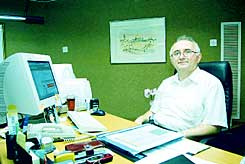A doctor who immigrated from Russia: I developed the technology that won the prize
By: Yuval Dror

Dr. David Michaeli, yesterday. "People must know the truth"
"We congratulate the winners of the Nobel Prize for Medicine for receiving the prize (...), however we believe that the prize committee did not take into account all the facts and studies that were done in the field and contributed to the development of the IRM technology. We claim that Dr. David Michaeli is a significant contributor to the development of the technology. We request From the committee to reconsider their decision regarding the winners of the 2003 Nobel Prize for Medicine and to include Dr. Michaeli as the laureate." This is how a letter sent last week by David Vazana, director of the technology incubator in Ashkelon, to the Nobel Prize committee in Stockholm begins.
About ten days ago, Dr. Paul Lauterbur from the USA, and Dr. Peter Mansfield from Great Britain were announced as winners of the Nobel Prize in Medicine for this year. The two published research in the field of magnetic imaging, which led to the development of MRI devices (which allow imaging of internal organs in a non-invasive manner). However, Dr. David Michaeli, an Israeli physician who immigrated from Russia in 1993, claims that he deserves the prize, and not the announced winners. , he has certificates, proving that he was the first in the world to engage in diagnosis for medical purposes using magnetic fields. "It's an injustice," says Michaeli, "People must know the truth."
Michaeli is not the first to protest the committee's decision: the American Raymond Demadian published ads in newspapers in the US last week, claiming that the award was stolen from him.
Michaeli (originally Michaelshvili), born in Georgia, worked since 1969 at the Institute of Neurosurgery in St. Petersburg as an intern, and at the same time studied medicine. "I witnessed a case where a woman arrived after an accident conscious, but died a quarter of an hour later due to a brain hemorrhage. I asked myself how come they didn't invent a device that would detect such cases", he says. According to him, one night he dreamed that he was walking among magnets and then the idea came to him to test magnetic applications in the field of imaging. "My brothers laughed, they were angry that I woke them up to tell about the dream."
Michaeli turned to Prof. Yuri Zotov who worked at the institute and presented the idea to him. It got excited, and managed to get Michaeli into a military facility where experiments were done with magnetic fields. Michaeli built a prototype and tested it on rabbits and finally on himself, at strengths that are currently prohibited.
Michaeli says that already in 1969 he submitted the first patent for the device, but the Russian Patent Office rejected the request. After trying a few more times, he was advised to file a patent for a method rather than the device itself. Michaeli did so in 1974, but the request was rejected. In the early 80s, when he heard about the CT invention, he returned and demanded to approve the patent. The Ministry of Health has announced that it will support the request if it proves that no genetic damage has occurred as a result of using the device.
In 1985, Michali had a daughter. After undergoing tests that proved that she had not suffered genetic damage, it was decided to approve the patent. Michaeli explains that his work in the field was not recognized, because in those years he could not publish his findings as Damadian did in 1971. However, according to him, documents in his possession, and other documents in the Russian Institute and the Patent Office, will prove that he submitted applications for patents back in the late 60s.
Michaeli, who is developing a device for measuring intracranial blood pressure in a greenhouse in Ashkelon, hopes that the committee will delay awarding the award until the matter is clarified: "To win, you need to recommend. I am looking for a senior official in the field who will read the documents I have and recommend me."
In response to the question if he does not think that the current engagement with the issue is petty, Michaeli answers in frustration: "It's like raising a child, nurturing him and then someone snatches him from under your hands. Here in Israel, a student who just finished university turns to me and tells me that I don't understand MRI-B just because he speaks good Hebrew and I don't. It boils me. I know more about MRI than anyone else."
Nobel: 102 years of awards - and storms around them
The Nobel Prize, which is the world's most prestigious scientific award, has caused quite a stir since it was first awarded in 1901. The award was originally given to scientists in the fields of chemistry, physics, medicine, literature and peace. Only in 1968 was it decided to also give a Nobel Prize in economics. The decisions of the prize committee and its deliberations are confidential.
Some argue that there are many cases where people who deserved the award did not win it for various reasons or won it for questionable reasons.
For example, it is claimed that John McLeod, who won the Nobel Prize for Medicine in 1923 with Frederick Banting for the discovery of insulin, was on vacation at the time of the discovery. Some mention that some of the important researchers never won the Nobel Prize - for example Thomas Edison, Sigmund Freud, the Wright brothers and more.
